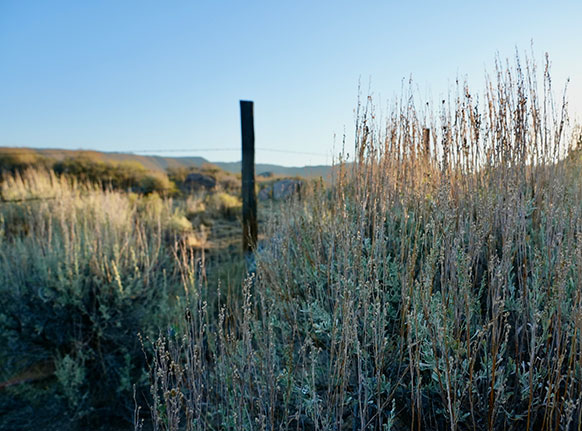UW-Led Institute Releases New Film on Managing Invasive Annual Grasses
Published October 08, 2025

The sun rises over the sagebrush steppe in Sublette County, one of the places where efforts to manage invasive grasses are chronicled in the “Defend Your Core” film series. (IMAGINE Photo)
The University of Wyoming’s Institute for Managing Annual Grasses Invading Natural
Ecosystems (IMAGINE) has released a new educational film for Western communities grappling
with the spread of invasive annual grasses.
IMAGINE works with local, state and regional partners to prevent and manage the spread
of these plants through scientific research, outreach education, and the development
of practical resources for land managers and landowners.
Invasive annual grasses, including cheatgrass, medusahead and ventenata, are the leading
cause of land degradation in the sagebrush biome. These grasses already impact more
than 100 million acres in the western U.S., reducing forage quality for livestock
and wildlife, suppressing native plants, and altering wildfire frequency and severity.
“The problem has seemed intractable for generations -- since the 1800s -- and we finally
have the tools to make this better,” says Brian Mealor, director of IMAGINE and UW’s
Sheridan Research and Extension Center. “We want to empower (viewers) with the knowledge
that people are doing this and succeeding.”
The film’s title, “Defend Your Core,” refers to a research-based management strategy
that encourages land managers to prioritize protection of intact “core” areas not
yet impacted by invasive grasses, then expand those areas by treating invasive grasses
approaching the perimeter.
“Defend Your Core” is the first of a series chronicling efforts to manage invasive
grasses in three Wyoming counties -- Carbon, Sheridan and Sublette -- as well as in
Elko, Nev.; Gunnison, Colo.; and Craters of the Moon National Monument and Preserve
in Idaho. New episodes will be released periodically, starting in November and continuing
through March.
Mealor hopes the film series will inspire Western communities to take action using
an expanding suite of new management and treatment options.
The project brings together university scientists, county weed and pest districts,
county commissioners, private landowners and nonprofit organizations, as well as federal
and state agencies.
“We are all in this together,” says Tom Barnes, a third-generation Nevada rancher
who contributed to the film and has been implementing cheatgrass management strategies
on his property.
“Everyone should care,” adds Lacey Clarke, Idaho Cheatgrass Challenge coordinator
for Pheasants Forever and a contributor to the film. “(Invasive annual grasses) affect
everybody everywhere eventually somewhere down the line.”
Funding partners for the film series include the Bureau of Land Management, Intermountain
West Joint Venture, National Park Service, Natural Resources Conservation Service’s
Working Lands for Wildlife, U.S. Fish and Wildlife Service, and the Watt Foundation.
Collaborators include the Barnes Ranch Inc., Carbon County Weed and Pest District,
Gunnison County Commission, Masters Ranch, Nevada Department of Wildlife, Northeast
Wyoming Invasive Species Working Group, Pheasants Forever, Sheridan County Weed and
Pest District, Sublette County Weed and Pest District, and Wyoming Wild Sheep Foundation.
To watch “Defend Your Core,” visit www.youtube.com/watch?v=-ROskL10a1Q. To view the entire series, visit www.invasivegrasses.com/films.
About the UW College of Agriculture, Life Sciences and Natural Resources
The University of Wyoming College of Agriculture, Life Sciences and Natural Resources serves students and communities through innovative scholarship, research and outreach. Guided by the land-grant principles of discovery and experiential learning, the college facilitates meaningful educational opportunities in the classroom, laboratory and community. The college offers degrees in the departments of agricultural and applied economics, animal science, botany, ecosystem science and management, family and consumer sciences, molecular biology, plant sciences, veterinary sciences, and zoology and physiology. The college also offers degree programs in agricultural communications, microbiology, and ranch management and agricultural leadership. To learn more, visit www.uwyo.edu/uwag or call (307) 766-4133.

